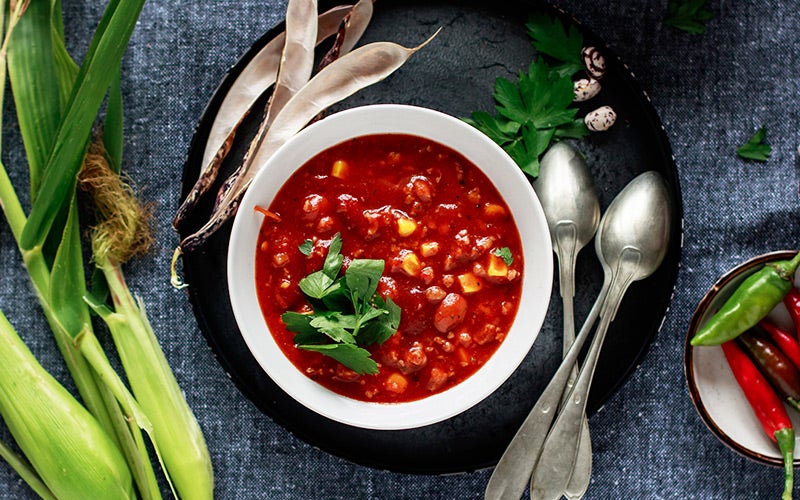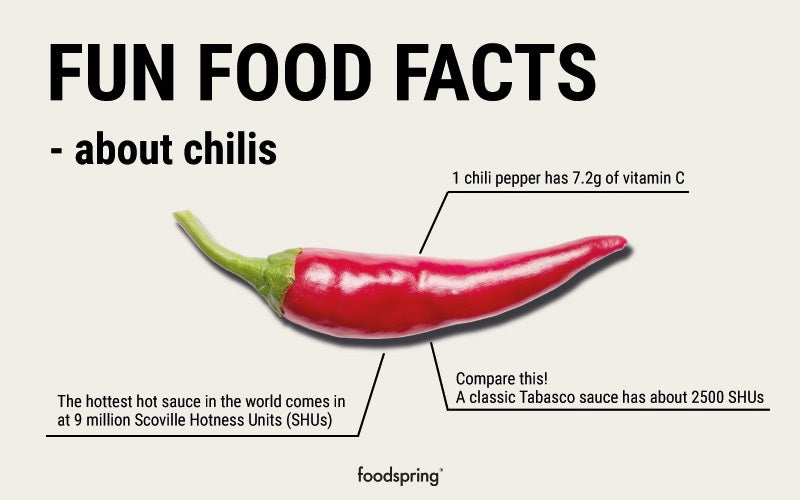Is spicy food good for you?
 ©Viktorné Lupaneszku
©Viktorné Lupaneszku
While we’re stuck inside to #flattenthecurve, we might have more limited access to varied diets than we usually would. So let’s dig deep into our spice drawers and turn up the heat! Not only is spicy food good for you – it can provide a much-appreciated new spin on dishes you already know.
Why is spicy food good for you?
When the weather is cold, a plate of fiery-hot chili does wonders to warm you up. We’re happy to toss in a few extra chili peppers during this time of immune stress. All the better, in fact! Because capsaicin – the active component contained in chili peppers – provides the peppers with their intense heat and heats our bodies up, too. Capsaicin stimulates thermogenesis: making our bodies turn up the heat. Capsaicin is found in foods such as cayenne pepper, hot peppers, chili pepper, Tabasco and pepperoncini. Fun fact: The spiciest hot sauce in the world measured up to 9 million Scoville units (the scale used to measure spiciness). In comparison, a conventional Tabasco sauce has about 2500 Scoville units. Is eating spicy food good for you? You be the judge.
No chili recipe on hand? Then try our delicious chili con carne recipe with rice. Our version is quick to make, keeps you full for a long time and contains loads of protein.
Our Tip: Eating the same old foods got you down? Try tossing in some chili powder to mix things up and boost your mood. Did you know there are all sorts of chili powder out there, and each one has its own flavor profile and spiciness level? Ancho chili is mild, smoky and a bit sweet, while cayenne is bright and full of heat. Next time you make some noodles or zoodles with bolognese, try adding a pinch of chili!
Is spicy food good for a cold?
If your nose is running or your throat is sore, reach for a hot lemon with ginger right away. Just like the chili pepper, ginger has a certain spiciness. Plus, this hot root’s special combination of minerals can have a boosting effect on our immune system. And just look at these figures: 100g of ginger contains 5mg of vitamin C, 43mg of magnesium, 16mg of calcium and 415mg of potassium. On top of that, you get 1.8g of protein and 2g of fiber in each 100g!
Tip: Our Daily Vitamins give you 100% of all your essential vitamins. Without any chemicals. We just take the best parts of fruits and vegetables and pack them into capsule form.
Can eating spicy food burn calories?
Spicy food can stimulate the body’s thermogenesis. This means that your body produces more heat, which consumes energy. We’d love it if we burned all the calories we are eating while we’re eating them! But it’s sadly just a pipe dream. Of course, thermogenesis does consume a few calories. However, the effect is too small to create any measurable weight loss.

Want to lose weight effectively and for the long term? We recommend a moderate calorie deficit of 200 to 500 calories. Our Shape Shake 2.0 will support your goals by acting as a meal replacement as part of a balanced diet.
Fun Facts
Chili peppers add their special spiciness to our food. They heat us up and stimulate thermogenesis in our bodies. Here are a few more fun facts about chili!

Conclusion
- Spicy food stimulates thermogenesis, i.e. it makes our bodies produce more heat
- Capsaicin is the active component of chili peppers that makes them taste hot
- Ginger contains tons of helpful minerals, such as vitamin C
- Chili con carne is a delicious and warming dish to turn up the heat!
Sources for this article
We at foodspring use only high-quality sources, including peer-reviewed studies, to support the facts within our articles. Read our editorial policy to learn more about how we fact-check and keep our content accurate, reliable, and trustworthy.






























